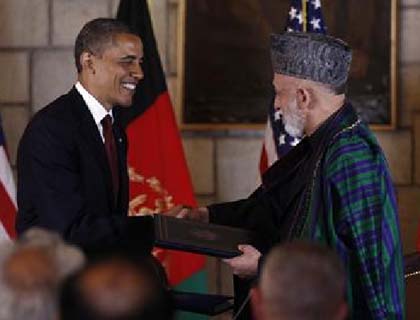In Brussels meeting, once again NATO emphasized on its long-term commitment to Afghanistan. The US, Italy and Germany are to keep a small number of their forces in order to provide Afghan Security forces technical support. Meanwhile countries like Britain which has the second largest number of forces after the US did not clarify whether it also would keep part of its current forces or withdraw them completely. It also becomes unobvious that how many soldiers will be kept.
Such suspicion was linked to two obsessing issues related to Afghan government. The Afghan government has not yet signed the strategic contraction with the United States which should determine the structure of bilateral relationship after withdrawal. However, President Karzai signed similar contract with many European and Non-European countries without hesitation. For instance, he signed strategic partnership with India without caring about its possible external political consequences because Delhi’s Arch Rival, Pakistan, is seriously worried about increasing presence of India in Afghanistan. Similar contracts are signed without assessments of benefits and harms to our national interest.
On the other hand, when it comes to US, the stance of Mr. President differs which actually deteriorates the security, political and economic situation. United States was the first country which showed willingness to sign the strategic partnership which would potentially change the country into one of the closest allies of Washington out of NATO members. But Kabul officials have preferred to step back and postpone the date. President Karzai denoted the signature of such a partnership to Grand Traditional Assembly (Loya Jirga) which is organized to decide on highly important national issues.
So first of all, Mr. President did not summon the traditional assembly when he signed similar partnership with India and other countries. Why he is doing so in the case of US who poured billions of dollars and made huge sacrifices to stabilize the administration of President Karzai. No doubt, without financial and military support of the US, the government is still not strong enough to protect civilians. Even the salary of government employees and politicians are paid from the taxed dollars of the US. Meanwhile it is again the US that Kabul officials still show willingness to delay the partnership contract. Why?
When months ago President Karzai said that Taliban were working in collusion with the United States and their activities prolong the presence of US, the New York Time wrote that Mr. Karzai was biting the hand which feeds him. However, later on he said that his statements were miss-interpreted but obviously he does not maintain friendly relation with Washington. He tries to pressurize the US to get bigger morsel. Exactly it has not become clear what kind of promises and commitment he expects from the US.
However, it is said that his government asks for equipment of Afghan security forces and long-term financial support. These two issues look tricky at a glimpse because it reflects the situation in a manner that US is not prepared to equip Afghan security forces with modern weapon or possibly cut its financial support.
First of all, the US has equipped Afghan security forces. It changed police and army from non-existent to somehow strong establishments that, if the ethnic and communal political leaders do not interfere, are capable to cope with domestic insurgency. It has also poured billions of dollars and presently huge part of government employees and development budget are paid by US.
Considering the above issues, is Washington trying to cut is support and let the very government it strengthened and empowered to dwindle? It looks unwise if not stupid.
Secondly, the very strategic partnership means that the US engages itself into commitment to defend it from internal or external threats. In terms of financial support, even before the signature of partnership, it has promised to give billions of dollars in civil and military support. As in Brussels and previously in second Tokyo conference, they emphasized that they will not leave the country and alone will help Afghanistan to stand on its own feet. But such supports are conditioned to serious efforts of government to fight corruption, guarantee human rights, good governance and free and fair elections.
The above conditions are not for their own interest but for Afghans. The corruption has created gap between government and civilians and also left government ineffective in meeting people’s basic needs. Free and fair election is one of the most important factors to ensure future political stability. If it is wreaked once again, it is highly possible that communal leaders use their influence and try to stand against the government which certainly will pave the way for new round of civil war.
Finally, the government by putting the destiny of partnership with US has caused problem. Foreign NGO’s have stopped working due to security concerns. Many have set their schedule to 2014, waiting to see what will happen. Afghan entrepreneurs have also withdrawn their money or kept them somewhere safe. They are not investing due to ruling uncertainty. The only thing that can send a strong message to investors is that the government will not collapse and militants will not be able to disrupt the security situation. Such a strong assurance can be made only by the strategic partnership be signed and the United States assure that it will not let the country to change to headquarter of Taliban militants. I hope Afghan government should watch out the economic and political consequences of their policies and do not pull the country into chaos unintentionally.

